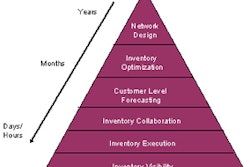Boston — January 17, 2007 — Enterprises continue to undertake indirect procurement outsourcing initiatives, but a failure to achieve internal compliance in parallel with improved supplier management is driving lingering dissatisfaction with these programs, according to a new study from NelsonHall, the business process outsourcing (BPO) analyst firm.
"Organizations believe that they have negotiated favorable discounts from suppliers, but dissatisfaction with the overall cost-effectiveness of their indirect procurement services persists since the level of centralization of indirect procurement remains low and they continue to lack visibility of spend across the enterprise," said Rachael Stormonth, research director at NelsonHall and author of the study.
In the study, "Indirect Procurement Outsourcing: Customer Requirements," Stormonth, provides an assessment of global indirect procurement business issues and attitudes towards how these issues need to be addressed.
Key Challenges
The major indirect procurement challenges for organizations revealed in the report include:
Accordingly, the first issue to be addressed in the majority of organizations is improved management of suppliers. Typically, organizations aim to improve their ability to reduce the cost of goods and services and the cost of procurement, to accelerate sourcing cycle times and to improve vendor management. They expect to achieve improved vendor management through better spend visibility as well as through enhanced abilities to manage supplier performance through a single interface.
In line with this requirement, NelsonHall's research supports the conclusion that organizations need to implement "best practice" indirect procurement processes and systems as part of an indirect procurement outsourcing contract. "The majority of organizations would like access to external expertise and procurement best practice," said Stormonth. "Moreover, the majority of organizations would be prepared to transfer responsibility for implementing, enhancing and supporting the associated indirect procurement applications."
Compliance Comes Second
Internal compliance is not seen as an immediate priority, and only once the objective of improved supplier management has been achieved will organizations consider themselves ready to address internal compliance. However, NelsonHall believes internal compliance needs to be addressed more rapidly and that, to achieve maximum benefit, organizations should address both supplier management and compliance and internal compliance simultaneously rather than separately.
In many organizations indirect procurement has been a low priority compared to direct procurement, receiving lower access to investment and specialist personnel. As a result, some organizations are now outsourcing indirect procurement services to improve the management of these increasingly important processes.
Explains Stormonth: "Organizations want an improved process compared to their in-house capability. To achieve this goal vendors need to offer end-to-end process improvement across both sourcing and category management and purchase-to-pay processes. According to NelsonHall, outsourcing one of these processes in isolation is unlikely to deliver both the vendor management and the internal compliance required for an optimum solution."
NelsonHall's global study was based on user interviews with more than 300 major organizations across a range of industry sectors. The "Indirect Procurement Outsourcing: Customer Requirements" study is available as part of NelsonHall's Procurement Sourcing program.
"Organizations believe that they have negotiated favorable discounts from suppliers, but dissatisfaction with the overall cost-effectiveness of their indirect procurement services persists since the level of centralization of indirect procurement remains low and they continue to lack visibility of spend across the enterprise," said Rachael Stormonth, research director at NelsonHall and author of the study.
In the study, "Indirect Procurement Outsourcing: Customer Requirements," Stormonth, provides an assessment of global indirect procurement business issues and attitudes towards how these issues need to be addressed.
Key Challenges
The major indirect procurement challenges for organizations revealed in the report include:
- A strong corporate requirement to reduce the cost of indirect goods and services;
- Difficulties in managing large numbers of suppliers in the absence of adequate breadth of internal category management expertise;
- Difficulties in managing large numbers of suppliers in the absence of common indirect procurement systems, processes and interfaces;
- Lack of indirect spend visibility.
Accordingly, the first issue to be addressed in the majority of organizations is improved management of suppliers. Typically, organizations aim to improve their ability to reduce the cost of goods and services and the cost of procurement, to accelerate sourcing cycle times and to improve vendor management. They expect to achieve improved vendor management through better spend visibility as well as through enhanced abilities to manage supplier performance through a single interface.
In line with this requirement, NelsonHall's research supports the conclusion that organizations need to implement "best practice" indirect procurement processes and systems as part of an indirect procurement outsourcing contract. "The majority of organizations would like access to external expertise and procurement best practice," said Stormonth. "Moreover, the majority of organizations would be prepared to transfer responsibility for implementing, enhancing and supporting the associated indirect procurement applications."
Compliance Comes Second
Internal compliance is not seen as an immediate priority, and only once the objective of improved supplier management has been achieved will organizations consider themselves ready to address internal compliance. However, NelsonHall believes internal compliance needs to be addressed more rapidly and that, to achieve maximum benefit, organizations should address both supplier management and compliance and internal compliance simultaneously rather than separately.
In many organizations indirect procurement has been a low priority compared to direct procurement, receiving lower access to investment and specialist personnel. As a result, some organizations are now outsourcing indirect procurement services to improve the management of these increasingly important processes.
Explains Stormonth: "Organizations want an improved process compared to their in-house capability. To achieve this goal vendors need to offer end-to-end process improvement across both sourcing and category management and purchase-to-pay processes. According to NelsonHall, outsourcing one of these processes in isolation is unlikely to deliver both the vendor management and the internal compliance required for an optimum solution."
NelsonHall's global study was based on user interviews with more than 300 major organizations across a range of industry sectors. The "Indirect Procurement Outsourcing: Customer Requirements" study is available as part of NelsonHall's Procurement Sourcing program.

















